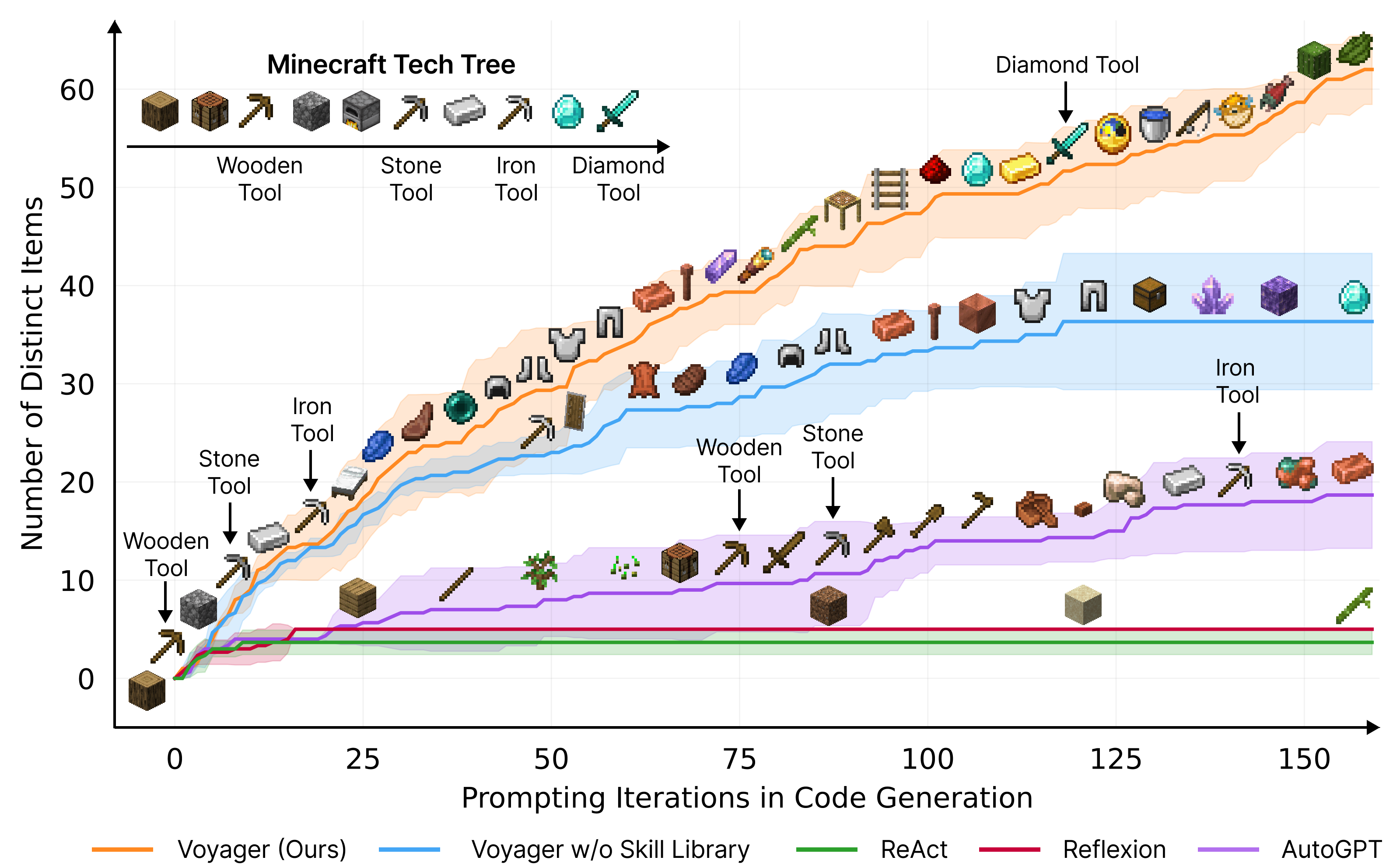2023 VoyagerAnOpenEndedEmbodiedAgent
- (Wang, Xie et al., 2023) ⇒ Guanzhi Wang, Yuqi Xie, Yunfan Jiang, Ajay Mandlekar, Chaowei Xiao, Yuke Zhu, Linxi Fan, and Anima Anandkumar. (2023). “Voyager: An Open-Ended Embodied Agent with Large Language Models.” doi:10.48550/arXiv.2305.16291
Subject Headings: Minecraft, LLM-based Agent, Voyager AI Agent.
Notes
- The paper introduces VOYAGER, a novel LLM-powered embodied agent designed for autonomous exploration and skill acquisition in Minecraft, without human intervention.
- The paper outlines VOYAGER's three main components: an automatic curriculum for task progression, a skill library for behavior retention and retrieval, and an iterative prompting mechanism for continuous self-improvemen.
- The paper highlights VOYAGER's use of GPT-4 for generating action plans and executing tasks based on real-time feedback from the game environment, without needing direct model parameter fine-tuning``【oaicite:5】``.
- The paper demonstrates VOYAGER's superior performance in lifelong learning scenarios within Minecraft, significantly outperforming state-of-the-art methods in acquiring unique items, traveling distances, and unlocking technological advancements faster``【oaicite:4】````【oaicite:3】``.
- The paper emphasizes the agent's ability to generalize learned skills to new, unseen environments, showcasing VOYAGER's potential applications in more complex, real-world tasks beyond gaming``【oaicite:2】``.
- The paper contributes to the field of AI and robotics by presenting a system that combines the vast knowledge of a large language model with the dynamic interaction capabilities of an embodied agent, thus bridging a gap in autonomous intelligent systems``【oaicite:1】``.
- The paper is presented and discussed at prominent AI conferences such as NeurIPS, highlighting its impact and relevance in the ongoing development of intelligent autonomous systems``【oaicite:0】``.
Cited By
Quotes
Abstract
We introduce Voyager, the first LLM-powered embodied lifelong learning agent in Minecraft that continuously explores the world, acquires diverse skills, and makes novel discoveries without human intervention.
Voyager consists of three key components: 1) an automatic curriculum that maximizes exploration, 2) an ever-growing skill library of executable code for storing and retrieving complex behaviors, and 3) a new iterative prompting mechanism that incorporates environment feedback, execution errors, and self-verification for program improvement.
Voyager interacts with GPT-4 via blackbox queries, which bypasses the need for model parameter fine-tuning.
The skills developed by Voyager are temporally extended, interpretable, and compositional, which compounds the agent's abilities rapidly and alleviates catastrophic forgetting.
Empirically, Voyager shows strong in-context lifelong learning capability and exhibits exceptional proficiency in playing Minecraft.
It obtains 3.3x more unique items, travels 2.3x longer distances, and unlocks key tech tree milestones up to 15.3x faster than prior SOTA.
Voyager is able to utilize the learned skill library in a new Minecraft world to solve novel tasks from scratch, while other techniques struggle to generalize.
We open-source our full codebase and prompts at https://voyager.minedojo.org/.
Introduction
Building generally capable embodied agents that continuously explore, plan, and develop new skills in open-ended worlds is a grand challenge for the AI community. Classical approaches employ reinforcement learning (RL) and imitation learning that operate on primitive actions, which could be challenging for systematic exploration, interpretability, and generalization. Recent advances in large language model (LLM) based agents harness the world knowledge encapsulated in pre-trained LLMs to generate consistent action plans or executable policies. They are applied to embodied tasks like games and robotics, as well as NLP tasks without embodiment. However, these agents are not lifelong learners that can progressively acquire, update, accumulate, and transfer knowledge over extended time spans.
Let us consider Minecraft as an example. Unlike most other games studied in AI, Minecraft does not impose a predefined end goal or a fixed storyline but rather provides a unique playground with endless possibilities. An effective lifelong learning agent should have similar capabilities as human players: (1) propose suitable tasks based on its current skill level and world state, e.g., learn to harvest sand and cactus before iron if it finds itself in a desert rather than a forest; (2) refine skills based on environment feedback and commit mastered skills to memory for future reuse in similar situations (e.g. fighting zombies is similar to fighting spiders); (3) continually explore the world and seek out new tasks in a self-driven manner.
Voyager Components We introduce Voyager, the first LLM-powered embodied lifelong learning agent to drive exploration, master a wide range of skills, and make new discoveries continually without human intervention in Minecraft. Voyager is made possible through three key modules: 1) an automatic curriculum that maximizes exploration; 2) a skill library for storing and retrieving complex behaviors; and 3) a new iterative prompting mechanism that generates executable code for embodied control. We opt to use code as the action space instead of low-level motor commands because programs can naturally represent temporally extended and compositional actions, which are essential for many long-horizon tasks in Minecraft. Voyager interacts with a blackbox LLM (GPT-4) through prompting and in-context learning. Our approach bypasses the need for model parameter access and explicit gradient-based training or finetuning.
...

...
Conclusion
In this work, we introduce Voyager, the first LLM-powered embodied lifelong learning agent, which leverages GPT-4 to explore the world continuously, develop increasingly sophisticated skills, and make new discoveries consistently without human intervention. Voyager exhibits superior performance in discovering novel items, unlocking the Minecraft tech tree, traversing diverse terrains, and applying its learned skill library to unseen tasks in a newly instantiated world. Voyager serves as a starting point to develop powerful generalist agents without tuning the model parameters.
References
;
| Author | volume | Date Value | title | type | journal | titleUrl | doi | note | year | |
|---|---|---|---|---|---|---|---|---|---|---|
| 2023 VoyagerAnOpenEndedEmbodiedAgent | Yuke Zhu Guanzhi Wang Yuqi Xie Yunfan Jiang Ajay Mandlekar Chaowei Xiao Linxi Fan Anima Anandkumar | Voyager: An Open-Ended Embodied Agent with Large Language Models | 10.48550/arXiv.2305.16291 | 2023 |